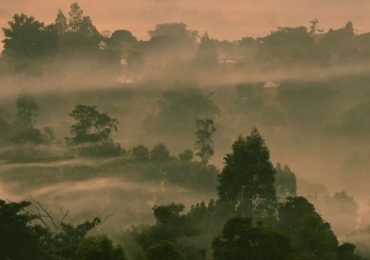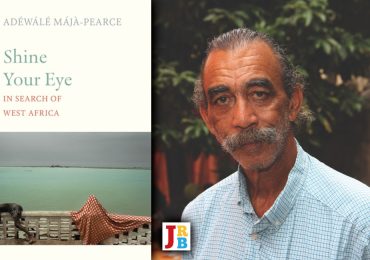The JRB Editorial Advisory Panel member James Murua reports back from his trip to the Salon du Livre de Mayotte, which took place on the island nation’s capital, Mamoudzou, from 17–20 October 2019.
I approached the check-in counter at Jomo Kenyatta International Airport and proffered my passport.
‘Where are you going?’ the lady in the sharp Kenya Airways uniform asked me.
‘Dzaoudzi,’ I said.
‘Where is that? Is that in China? This is the wrong counter for that,’ she said.
‘But the signs say I should be here,’ I countered.
As we were talking another staffer came through and explained to the first that this was in fact the right counter and where the destination was in the system.
I was just like this lady a few weeks before, when I received an invitation to attend the Salon du Livre de Mayotte, which in English translates to the Mayotte Book Fair. I even went online to investigate whether the festival and its home were a real thing or a hoax.
It turns out Mayotte, with a population of just under 300,000 people, is an island located off the coast of Southeast Africa, between northwestern Madagascar and northeastern Mozambique. A region of France, it the rather fascinating name ‘Department of Mayotte’. Thus I had to get a Schengen visa at the French embassy to attend the festival just off Africa’s coastline.
It was a two-and-a-half-hour flight to the Dzaoudzi–Pamandzi International Airport, and as we approached the island I saw it was surrounded by large coral reefs. I would learn that these reefs were the reason the island had been given its name. In the past, Arab ships, assuming the reefs were land, would run aground, leading to many deaths and spawning the macabre name ‘the island of Mawt’—’mawt’ in Arabic meaning ‘death’. Mawt became ‘Mayotte’ in the local Shimaore language; Kiswahili speakers will be familiar with this, as the word for the dead in that language is ‘maiti’.
On landing, I was received by our hosts and shuttled to the main island Mamoudzou where I met other festival delegates. Over the next few days, I met artists of all shades from around the Mozambican channel, including from Mozambique, Maurice, Tanzania, Reunion, Madagascar, Comoros, and some other countries like Cameroun and Kenya.
The festival kicked off on 17 October 2019, with Soibahadine Ibrahim Ramadani, President of the Departmental Council of Mayotte, as its chief guest. While there were translators present, it became clear that most of the discussions would be in French. As the full extent of my French is greetings, football cheers for the French national team and a song requesting that people make love, I knew that I would struggle. The other language spoken on the island is the aforementioned Shimaore, which sounded like a version of the Kiswahili that I speak in Kenya. I would try with modest success to speak to locals in Kiswahili when my lack of French became evident.
Over the next few days, there was the traditional literary festival fare you would expect: panel discussions, keynote addresses, readings; and those who attended could also buy books and associated paraphernalia from the countries that had attended.
The panels featured Paulina Chiziane, Johary Ravaloson, Corinne Fleury, Yianna Amodine, Adam Shafi, Elieshi Lema, Michèle Rakotoson, Wangui wa Goro, Jean-François Salmon, Nassur Attoumani, Lily Nyariki, and many other writers and publishing professionals. They had interesting titles like ‘Edition & diffusion of authors from Africa and the Mozambique Channel’ and ‘Bookstores & Publishers on the March in the Mozambique Channel’.
Away from the panel sessions, there was an open mic evening where those who had works in progress, both poetry and prose, read to those who had attended. There was also a theatrical performance of a play called ‘Espaciologie du Drame de Dzaoudzi’, directed by Alain Kamal Martial Henry, who is also the Director of the Directorate of Books and Public Reading.
The festival is pretty small, reflecting the country’s size, but what it lacks in size it makes up for in ambition. One of the most forward-thinking of its initiatives is the Agence Internationale du Livre pour L’Education (International Book Agency for Education) shortened to AILE, a platform created in 2018 to support the book value chain in the Mozambique Channel. With membership in Mayotte, Tanzania, Mozambique, Madagascar, Kenya and the Union of the Comoros, the project is currently selecting texts that will be translated across the languages of Portuguese, English and French.
Dr Alain Kamal Martial Henry gave an exclusive interview to the JRB:
James Murua for The JRB: Why was the Salon du Livre de Mayotte started? What are you trying to achieve?
Alain Kamal Martial Henry: The Salon du Livre de Mayotte’s main objective is to promote regional literatures and writers by giving support to editors and translators. We are looking forward to strengthening the book chain through professional exchanges in the Mozambican channel.
The JRB: Who are some of the authors who have attended the festival? How have you been selecting them?
Alain Kamal Martial Henry: We have invited local and Mozambican channel writers, especially from Mozambique, Tanzania, Kenya, Comoros, Madagascar, Reunion Island, Mauritius as well as France. The guests we have had are Paulina Chiziane, Adam Shafi, Elieshi Lema, Michèle Rakotoson, Jean-François Salmon, Nassur Attoumani, Abdou Mambo Baco, and many more.
The JRB: How has the festival been welcomed by citizens of Mayotte?
Alain Kamal Martial Henry: We are very happy that the population of Mayotte have placed the event as one of the most important in the country. People are aware that books are something very important for the country’s development so they are encouraged to visit and participate.
The JRB: Has there been any change in the perception of the importance of literature since you started the festival?
Alain Kamal Martial Henry: Yes, people used to read more foreign and Western books, now they have discovered local and regional writers, they have an interest in East African literature and Mozambican channel island writers. They have expressed an interest in books in multilingualism.
The JRB: Has it positively affected the writers of the islands?
Alain Kamal Martial Henry: Yes. They know now that they have an opportunity to share their books and stories, imagination and ideas with others, so they make good literature to share.
The JRB: With your region being part of France and with support from the mother country, do you consider this to be an African or African-themed European literary festival?
Alain Kamal Martial Henry: It’s an African book fair open to the world. We are African writers, we write as Africans and we share our books as Africans. We write in French and we are happy to have readers in France and other Francophone countries. Our interest is to write our African identity and our French and European history. We are an open society.
The JRB: The project isn’t just a literary festival but also an academic conference. What is the importance of these two huge events happening in your region?
Alain Kamal Martial Henry: Apart from Salon du Livre de Mayotte, we have the International Conference on the Civilisations of the Mozambique Channel. It’s a scientific promotion of our common heritage. As we support literature, we propose a sustainable project in human sciences. The importance is to collaborate in an academic project to empower our culture, our history, our languages, our societies in the word. Media talk a lot about many regions in the world but about the Mozambican channel very little is said. So combining books, fiction and science, will help to bring interest to our people.
The JRB: One of the interesting aspects of this project is the translation project between languages with AILE. Could you tell us a little about it?
Alain Kamal Martial Henry: AILE is a tool to bring more cooperation, more exchange, more intellectual production, more book publication, and more support in the book industries in our region. With the AILE programme, we can translate the main books (fiction and science) and share them with all members. Translating is building bridges. Interest is in the book market, empowering one’s knowledge, preparing our young generation to share more and build a consciousness of belonging to the same destiny in the same region.
The JRB: Is there any plan to partner with any festivals on the African mainland in the future?
Alain Kamal Martial Henry: We plan to collaborate with all professionals and institutions in the chain of books around the members. But the most important is to have the involvement of the states through ministries of culture and ministries of education in each country.
If the work the team at the Salon du Livre de Mayotte is doing succeeds, no one will wonder where this wonderful island on the Indian Ocean is ever again.
- You can read reporting I did from the festival here
- You can watch a playlist of YouTube videos from the Festival here
- Editorial Advisory Panel member James Murua is a writer based in Nairobi, Kenya. His literary blog can be found at jamesmurua.com.





